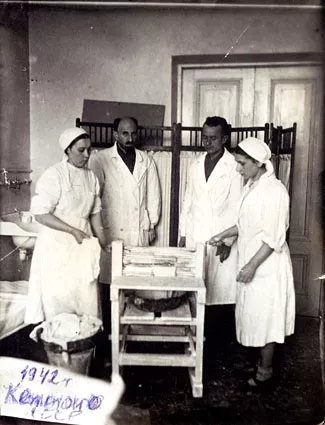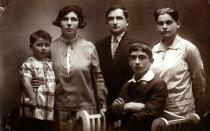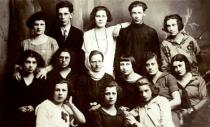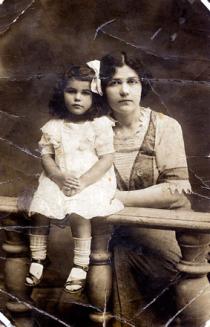This is a photo from our military hospital in Kemerovo in Siberia, where I spent two war years. First from right is me, the other people are doctors and nurse from this hospital. It is written in the bottom: ‘1942, Kemerovo’.
Kemerovo is a town in the western Siberia, 200 km east of Novosibirsk. It is situated on both banks of the river Tom. On one side of the river the town was built of wood but densely populated, and on the other it looked as if it was still under construction. There was a single street with some brick houses, three- and four-story high. The town grew during the war, because they evacuated the factories from Charkiv and Kiev, mostly arms factories. I remember a giant Charkiv tractors factory, which made tanks instead of tractors after the evacuation. When we arrived we found two empty school buildings with beds and tables with tablecloths on them put by the children. We were supposed to set up a hospital there. The personnel was boarded with the locals. They didn't have any decent houses, just that sort of large barracks. They had a corridor in the middle you entered the rooms from. Everyone had a room with a kitchen. We - me and another nurse - were hosted by a woman who worked in a factory all day long, her husband was in the army. She had an eight-year-old boy so she was glad there was always someone home when he got back from school. She had a bed and we were given a second one, and since we had night duties interchangeably we didn't need separate beds.
The hospital in Kemerovo was located in school buildings. It was large, consisted of two buildings. We only had one real surgeon, the rest were general practitioners. Everybody was retraining back then. I was told to put plaster casts. In Poland casts were applied by doctors and in Russia it was done by technicians. There was this girl in Kemerov, a very good plaster technician. Because there were two buildings they decided to create a second casting room and to put me in charge of it. I didn't have a clue about it but the girl taught me everything. To help me I was assigned a cleaning girl, Marusia, and a medical orderly who knew as much as I did. But I did learn and the quality of my casts was never questioned. It was a very tough work. Whole transports of wounded soldiers kept coming from the frontline, we had to remove all those pus-covered casts. They came all dirty, infested with lice. Whenever a train with the wounded came the personnel didn't sleep for a few days straight, until we brought them back to normal.
I was the only Pole among the personnel. There were some Ukrainian girls and the whole staff of a Kiev hospital. I didn't have anyone to speak Polish to, I didn't speak Russian. But I learned fast and used only Russian. Once a fire broke out in a local factory, lots of people got burned. We went to the civilian hospital to give them a hand. I stood there helping with something when I heard a female doctor speak to a girl: 'Zosia give me this, Zosia give me that.' I later came up to that Zosia and it turned out she was Polish. So I started to use Polish again.
In 1943 I learned from the paper that a Polish army is being formed and people were invited to enlist. The air was such that I wanted badly to fight, it seemed to me I wasn't doing enough. So I wrote a couple of letters to Berling, to the ZPP, and got a draft notice some time later. I went to Sielce near Ryazan where the camp of the Second Dabrowski Division was located

































